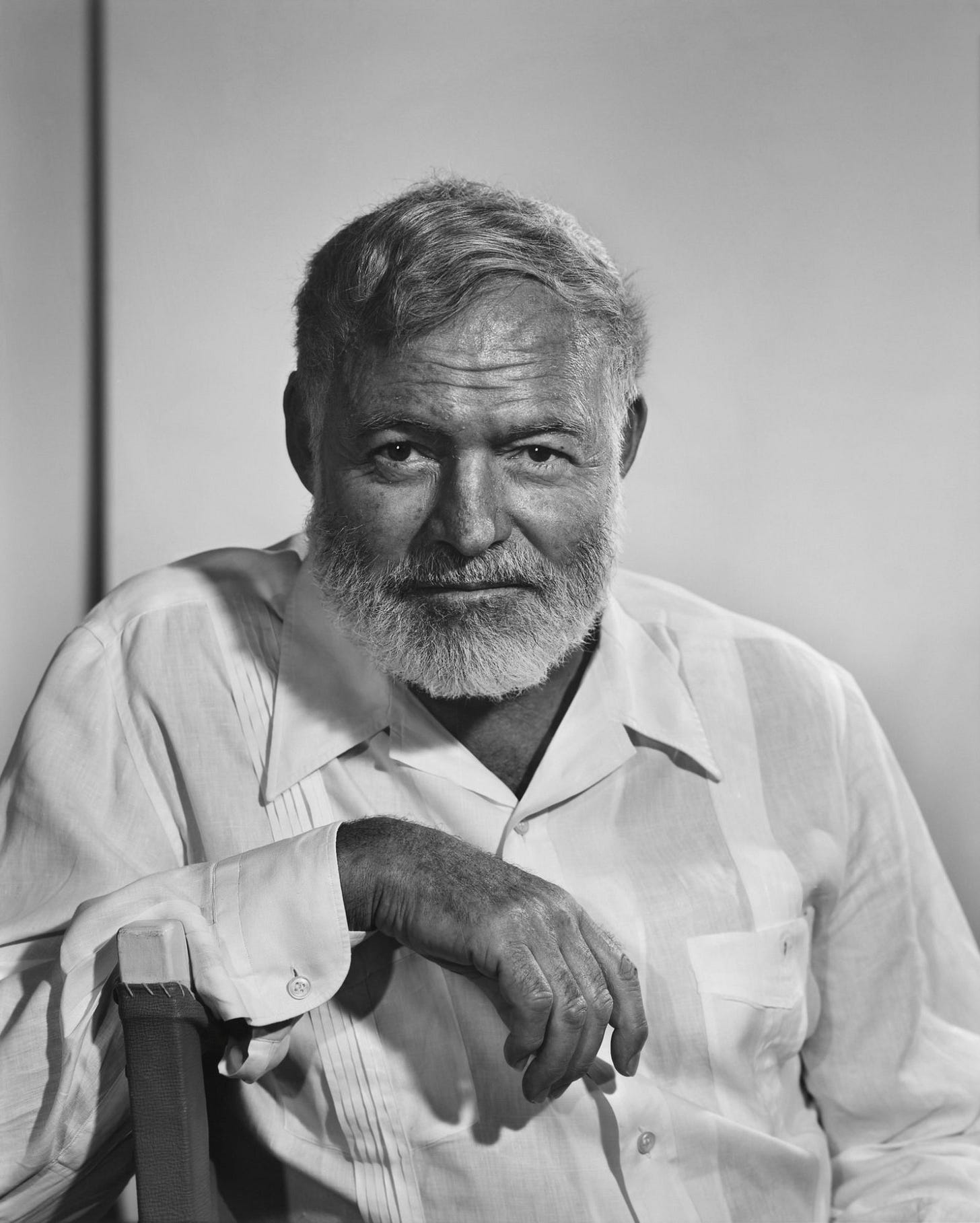Ernest Hemingway's brutal letter to F. Scott Fitzgerald on how to write better.
Notes on giants - Number 14
Welcome to Mental Garden. The following letter is part of our "Notes on giants" collection, in which we explore the thoughts of humanity's greatest minds.
To see the full library, click here.
🏷️ Categories: Life lessons, Writing.
After publishing his novel Tender is the Night in 1934, F. Scott Fitzgerald asked his good friend Ernest Hemingway for an honest opinion about the work.
And Hemingway gave him a brutally honest one.
His letter, included in Ernest Hemingway Selected Letters 1917–1961, is a little-known treasure full of timeless advice for any writer. If you write, if you struggle with the blank page, or if you doubt your own ability—pay attention.
Let’s break down Hemingway’s lessons point by point.

1. 90% of What You Write Is Pure Crap
“I write one page of masterpiece to ninety pages of shit.” — Ernest Hemingway
You can't get more direct than that.
Hemingway knew (from years of experience) that the genius who only produces gold is a myth. He made that very clear to his friend Fitzgerald, who was hesitant to write because he felt insecure when his work didn’t meet the standards he expected.
Fitzgerald was caught in what I call “the perfection trap.”
“For God’s sake write and don’t worry about what the people will say nor whether it will be a masterpiece.” — Ernest Hemingway
Hemingway reminds us of a simple truth: writing is dirty work.
In that sense, it’s like mining. You have to dig through a lot of worthless rock before finding a few nuggets of gold that make the whole painful process worthwhile. Sure, there are days of divine inspiration, but most are just days of heavy typing, sweat, and accepting that the result fell short of your potential.

What matters isn’t that every page shines.
What matters is writing all of them.
“If you write enough and as well as you can, there will be lots of masterpieces…” — Ernest Hemingway
Hemingway was at peace, knowing that being prolific meant it was only a matter of time before a masterpiece emerged—perhaps only after 90 pages of crap, as he said.
Good writing = production + intention.
That’s the formula for a good writer.
2. Respect Your Characters
“You began to monkey with your characters, having them come from things they didn’t come from, changing them into other people and that’s not done, Scott. If you take real people and write about them you can’t give them other parents than they have or make them do anything they wouldn’t do…” — Ernest Hemingway
Fitzgerald had used real people as inspiration for his characters, but he changed their stories. He invented parts. He made them say things they would never say in real life and do things they would never do.
To Hemingway, that was a serious mistake.
As he argues in the letter, if you’re inspired by real people, respect them. You can't manipulate their essence. Otherwise, what you’re writing isn’t a novel—it’s a beautifully faked story.
“By God, you took liberties with people’s pasts and futures, they are beautifully faked stories.” — Ernest Hemingway
Fiction isn’t about disguising reality. It’s about creating a fantasy with internal logic.
Hemingway gave him 2 possible solutions:
Create an entirely fictional character based on a real person—but make them unrecognizable.
Stay true to the essence of the person and portray them as they truly are.
Don’t create halfway-real characters that can be identified through your writing.
3. Write Honestly, Even If It Hurts
“Scott, write truly, no matter who it hurts or what it hurts, but don’t make any damn concessions.” — Ernest Hemingway
To Hemingway, Fitzgerald had compromised—he tried to please others with his writing. Maybe to avoid hurting certain people. Maybe to be more likable. Hemingway noticed it immediately, and it’s precisely that attitude that bothered him.
Writing without honesty is cowardice.
And worst of all—it doesn’t connect.
Let me give you examples of what Hemingway meant:
Nonfiction: In Hunger, Roxane Gay speaks openly about her relationship with her body, trauma, and anxiety. The point is clear: softening the truth would be dishonest. Raw reality is far more powerful.
Fiction: In Revolutionary Road, Richard Yates portrays the emptiness of a failed marriage with brutal honesty. He doesn’t shy away from ugly dialogue; in fact, he emphasizes it—because reality isn’t always beautiful and shiny.
Sometimes, reality is too raw to be hidden. Show it as it is.
4. Stop Paying Attention, and a Writer Dies
“You’ve been listening to the answers to your own questions for too long. That’s what dries up a writer—not listening (we all dry up, it’s not an insult to you). That’s where it all comes from. From seeing, from listening.” — Ernest Hemingway
This is the kind of advice only a writing veteran could give...
The writer’s raw material isn’t inside—it’s outside.
Writing isn’t about locking yourself in a room and waiting for magic to happen. It’s about opening your senses. Hemingway warns Fitzgerald not to fall into confirmation bias. Inspiration comes from seeing and listening to a variety of perspectives—not from replaying the same comforting ideas.
To create something interesting, you first have to be interested.
Virginia Woolf would agree with Hemingway. She called it “moments of being.”
5. Process Your Feelings
“Forget your personal tragedy. When you’re in real pain, use it—don’t fool around with it. Be as faithful in seeing your pain as a scientist would be. Don’t think something is important just because it happened to you.” — Ernest Hemingway
Many writers believe that simply writing about their emotions makes it literature.
To Hemingway, it doesn’t.
Feeling isn’t enough—we all feel. For it to become literature, those feelings must be processed. The key is precision and reflection. Feel, yes—but with the mindset of a scientist: observe your emotions seriously.
Here’s an example of what Hemingway meant:
Karl Ove Knausgård, a Norwegian writer, created a monumental autobiographical work. In Childhood Island, he narrates his life in vivid detail—good and bad moments, what he felt, what he learned, what he discovered in childhood innocence. His stumbles and triumphs…
Don’t just throw a tangled mess of emotions on the page. Work through them.
That kind of introspective development does resonate with readers.
6. Write—and Forget Everything Else
“We are only writers and what we are supposed to do is write.” — Ernest Hemingway
At this time, Fitzgerald was going through a very difficult period.
His wife had been diagnosed with schizophrenia, and he had to care for her, which affected his morale. He also fell into alcoholism and, on top of that, after the success of The Great Gatsby, his later works didn’t shine, causing financial trouble.
So what did Hemingway tell him?
“Scott, good writers always come back. Always. You’re twice as good now as when you thought you were really good. Now you can write twice as well as you ever could. All you have to do is write and not worry about fate.” — Ernest Hemingway
Hemingway knew what Fitzgerald was going through, but he also knew that for Fitzgerald, writing was both a refuge and a way to earn a living. He couldn’t afford to sit still—he had to focus on the one thing still within his control: writing.
Writing was how he could move forward.
Clarice Lispector wrote her deepest works while facing severe physical and mental health problems.
Marina Keegan wrote The Opposite of Loneliness just before she died. She didn’t wait for the “right moment.”
George Orwell, suffering from tuberculosis, wrote 1984 during his worst years of illness. Despite everything, he didn’t stop.
Now let’s think about us—about you and me.
I’m almost certain your situation is better than Fitzgerald’s or the others I’ve just mentioned. And yet, we often make excuses for not writing—no time, too many problems. Many wait for the ideal conditions… and in the end, they never write.
Don’t wait for the stars to align.
Don’t wait to be at your best to write.
What matters is making writing a priority. Only discipline will save you.
“I care for you very much and wish we could talk from time to time. We had some good talks, Scott. […] I’m doing well on a very long story. Hard to write.
Always your friend,
Ernest.”
✍️ Your turn: Is discipline more important than chasing brilliance on every page?
💭 Quote of the day: “I write one page of masterpiece to ninety pages of shit.” — Ernest Hemingway.
See you next time—take care and enjoy writing! 👋
References 📚
Hemingway, E. (2003). Ernest Hemingway Selected Letters 1917–1961.







Love this! Reminds me of the anecdotes I discovered in my great-grandfather’s memoir about his friendship with F. Scott Fitzgerald. check it out:
https://thesecretingredient.substack.com/p/what-my-great-grandfathers-memoir
This is such a meaty article, I need to tack it to my wall and read it over and over. Thank you,Alvaro.